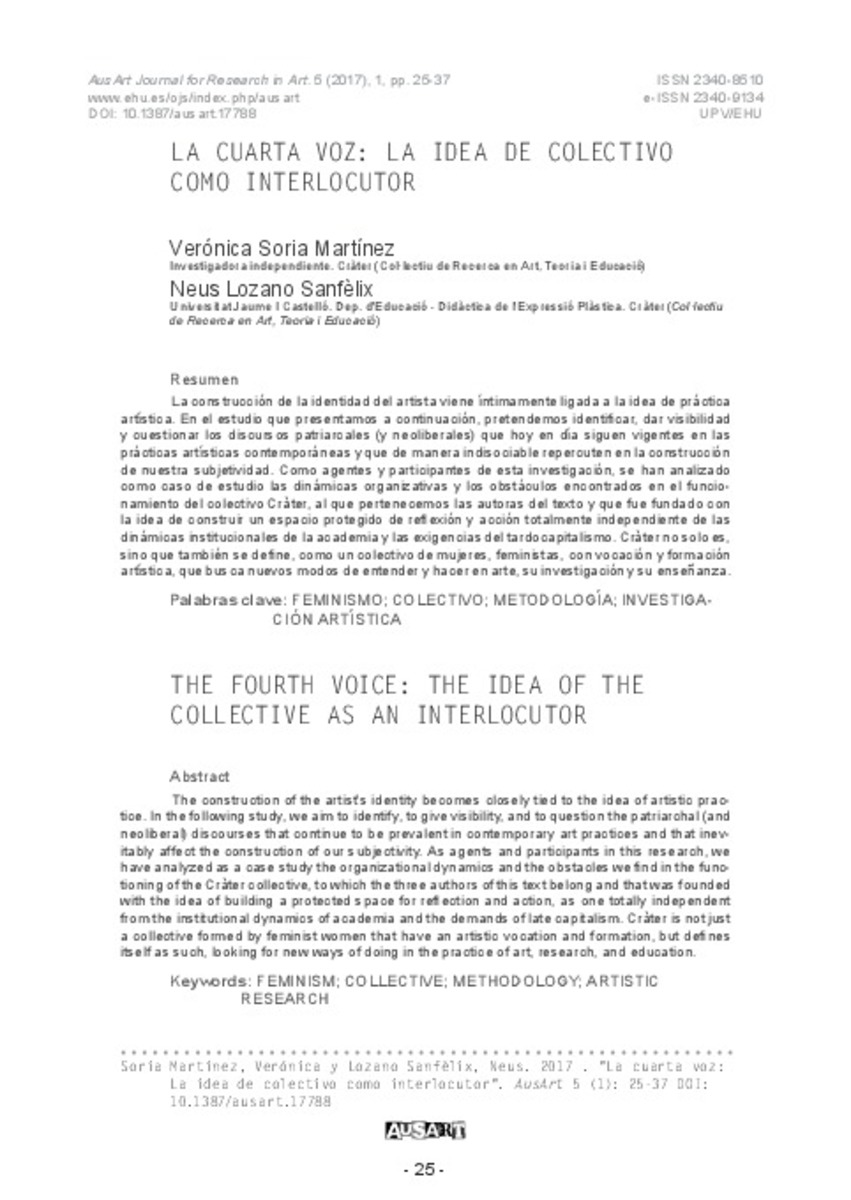Mostrar el registro sencillo del ítem
La cuarta voz: la idea de colectivo como interlocutor
| dc.contributor.author | Soria-Martinez, Verónica | |
| dc.contributor.author | Lozano-Sanfèlix, Neus | |
| dc.date.accessioned | 2017-11-20T08:16:09Z | |
| dc.date.available | 2017-11-20T08:16:09Z | |
| dc.date.issued | 2017 | |
| dc.identifier.citation | SORIA MARTÍNEZ, Verónica; LOZANO SANFÈLIX, Neus. La cuarta voz: la idea de colectivo como interlocutor. AusArt, 2017, vol. 5, no 1, p. 25-37 | ca_CA |
| dc.identifier.issn | 2340-8510 | |
| dc.identifier.issn | 2340-9134 | |
| dc.identifier.uri | http://hdl.handle.net/10234/170209 | |
| dc.description.abstract | La construcción de la identidad del artista viene íntimamente ligada a la idea de práctica artística. En el estudio que presentamos a continuación, pretendemos identificar, dar visibilidad y cuestionar los discursos patriarcales (y neoliberales) que hoy en día siguen vigentes en las prácticas artísticas contemporáneas y que de manera indisociable repercuten en la construcción de nuestra subjetividad. Como agentes y participantes de esta investigación, se han analizado como caso de estudio las dinámicas organizativas y los obstáculos encontrados en el funcionamiento del colectivo Cràter, al que pertenecemos las autoras del texto y que fue fundado con la idea de construir un espacio protegido de reflexión y acción totalmente independiente de las dinámicas institucionales de la academia y las exigencias del tardocapitalismo. Cràter no solo es, sino que también se define, como un colectivo de mujeres, feministas, con vocación y formación artística, que busca nuevos modos de entender y hacer en arte, su investigación y su enseñanza. | ca_CA |
| dc.description.abstract | The construction of the artist’s identity becomes closely tied to the idea of artistic practice. In the following study, we aim to identify, to give visibility, and to question the patriarchal (and neoliberal) discourses that continue to be prevalent in contemporary art practices and that inevitably affect the construction of our subjectivity. As agents and participants in this research, we have analyzed as a case study the organizational dynamics and the obstacles we find in the functioning of the Cràter collective, to which the three authors of this text belong and that was founded with the idea of building a protected space for reflection and action, as one totally independent from the institutional dynamics of academia and the demands of late capitalism. Cràter is not just a collective formed by feminist women that have an artistic vocation and formation, but defines itself as such, looking for new ways of doing in the practice of art, research, and education. | ca_CA |
| dc.format.extent | 13 p. | ca_CA |
| dc.format.mimetype | application/pdf | ca_CA |
| dc.language.iso | spa | ca_CA |
| dc.relation.isPartOf | AusArt, 2017, vol. 5, no 1, p. 25-37 | ca_CA |
| dc.rights | Attribution-ShareAlike 4.0 International | * |
| dc.rights.uri | http://creativecommons.org/licenses/by-sa/4.0/ | * |
| dc.subject | feminismo | ca_CA |
| dc.subject | colectivo | ca_CA |
| dc.subject | metodología | ca_CA |
| dc.subject | investigación artística | ca_CA |
| dc.subject | feminism | ca_CA |
| dc.subject | collective | ca_CA |
| dc.subject | methodology | ca_CA |
| dc.subject | artistic research | ca_CA |
| dc.title | La cuarta voz: la idea de colectivo como interlocutor | ca_CA |
| dc.title.alternative | The fourth voice: the idea of the collective as an interlocutor | ca_CA |
| dc.type | info:eu-repo/semantics/article | ca_CA |
| dc.identifier.doi | http://dx.doi.org/10.1387/ausart.17788 | |
| dc.rights.accessRights | info:eu-repo/semantics/openAccess | ca_CA |
| dc.relation.publisherVersion | http://www.ehu.eus/ojs/index.php/ausart/article/view/17788/15605 | ca_CA |
| dc.type.version | info:eu-repo/semantics/publishedVersion | ca_CA |
Ficheros en el ítem
Este ítem aparece en la(s) siguiente(s) colección(ones)
-
EDU_Articles [500]








